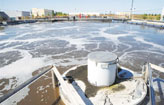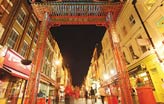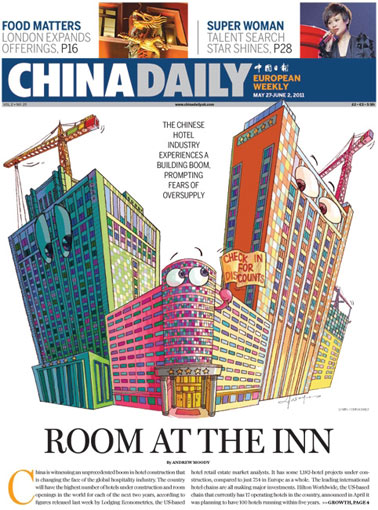Society
Pedal power
Updated: 2011-05-26 07:58
By Liu Xiangrui (China Daily)
|
Public servants at Beijing's Jinsong Sub-district Office use bicycles for their community service. Provided to China Daily |
|
Chargeable parking spaces along a Beijing street are almost empty, while free parking spaces are fully occupied. Liu Zhe / China Daily |

Rising parking fees, gas prices and traffic jams are causing more Beijing office workers to resurrect the trusty old bicycle. Liu Xiangrui reports.
Li Rui, a 26-year-old working for a media company, was hardly surprised when her friend told her about the "dramatic?drop in the number of cars parked near his company. She herself was one of those who had decided to change the way she commuted after hearing of Beijing's parking fee increases. The rise in parking costs is turning the city greener as more people opt to travel by bicycle, bus and subway, or carpool and walk, instead of using their cars. The latest parking rules, put in force on April 1, divide the capital into three zones with different parking fees. Inside the Third Ring Road, the parking fees can top 15 yuan ($2.3) an hour. Fees near Li's company in the city's busiest Wangfujing area have risen to 10 yuan an hour from 8 yuan, which was "already too high? she says.
Li, who used to leave her office late to avoid the rush-hour traffic, now spends about half an hour on the subway, traveling between her home near the West Fourth Ring Road and her workplace.
"I drive only on holidays or to malls with free parking," she says, adding that the new arrangement is saving her at least 1,000 yuan a month. She is even working with some of her colleagues to buy bicycles soon so they can all ride to work together.
A recent online poll by qq.com, one of China's largest Web portals, shows that the sharp increase in parking fees had caused more than 80 percent of its 42,600 respondents - 95.6 percent of whom were car owners - to change the way they commuted.
Most of them said they would reduce the frequency of car usage and avoid places with high parking fees, or try to use public transport more often to reduce expenditures.
Wang Dongjie, for example, sold the car he had for two years amid rising gas prices and parking fees, and has instead invested in a mountain bike.
"Driving a car in Beijing is so tiring, and I'm fed up with it, especially the jams in rush hour," says the IT worker, who used to drive almost every day and everywhere.
Now the 26-year-old cycles for about 40 minutes from his apartment near Jiuxianqiao outside northeast Fourth Ring Road, to work in Hujialou, near East Third Ring Road. He says it saves him 1,500 yuan a month.
"It's not only about transportation but also a good way to exercise," Wang says, adding that he also uses the cycle to go shopping at nearby malls. For weekend outings, he cycles to the subway station, and takes the subway. If required, he rents a car for the day.
Like Wang, Zhang Dong and his colleagues at Jinsong Sub-district Office use bicycles for their community service. The office purchased 90 bicycles in April and allocated them to different service teams in response to the city's call for greener traveling.
"Bicycles have made our community work more efficient, besides saving costs and improving residents' impressions of us," Zhang says.
The change in people's mode of travel in the wake of parking fee increases is having a visible impact on traffic congestion, a report released by the Beijing Municipal Commission of Transport on May 12 says.
Car-sharing is also catching on, according to Zhang Ye, a small trade company owner.
Ten people reached him shortly after he posted an online message offering to share his car, for a price, and detailing his route, on April 14.
He called his post, "Gas prices are up, parking fees are up, and I am suffocating".
Zhang regularly departs from Dingfuzhuang outside of East Fifth Ring Road at 7:50 am and starts his return journey at 6:10 pm from his foreign trade company near Jianguomen on East Second Ring Road. The drive usually takes him 40 minutes, and includes picking and dropping off the three people who share his car from their homes and workplaces.
He earns 1,800 yuan a month from this arrangement. "They (the car sharers) feel great about this, too, and we've got to know each other as good friends."
On weekday evenings, a number of private cars can be seen stopping by Bawangfen Bus Station to pick up interested car poolers heading to the eastern Beijing suburb of Yanjiao, he says.
Meanwhile, office worker Wu Yu, 25, who says the rising parking fees have not had a strong impact on her, admits, "The maddening jams, gas prices, plus limited parking places are diminishing my desire to drive".
She'd rather walk when the time and distance permit, she says, adding, "Then I don't have to make a special effort to lose weight."
E-paper

Tapping into the future
Foreign companies are investing in China's water industry as many predict a growing profit margin.
Headhunters ride on growth
Commercial property rides wave
Learning from the past
Specials

Cuisine central
London's Chinatown is helping diners appreciate full palate of Chinese food

Tying the knot
Danish couple's high-end macrame export business takes off in the mountains of Yunnan.

Truly a super woman
Li Yuchun first came to prominence in 2005 as the Super Girl winner, and since then has become an international star.


